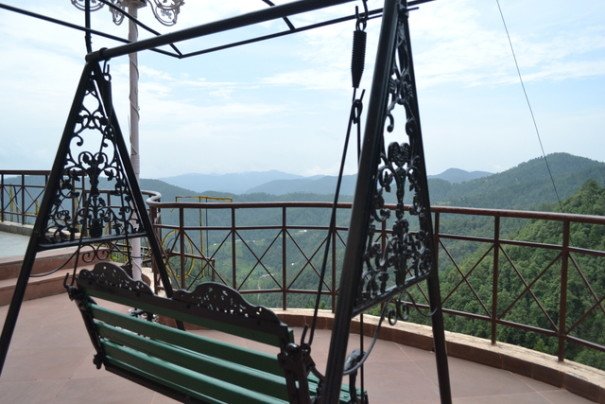
Happy Hour at the Grand Budapest Hotel of Himachal Pradesh

Happy Hour at the Grand Budapest Hotel of Himachal Pradesh
Whisky at Toshali
The bar has to be unlocked for us—that’s the odd thing.
The staff of Toshali Royal View Resort are, naturally, surprised by our presence: two white guys strolling into a hotel in the lower Himalayas, sweat cooling on their skin, monkey sticks in hand and camera bags slung across their chests. But does no other patron of the hotel—indeed, nobody else for miles around—have a thirst?
It’s April, and I’m spending several days with a close friend and fellow writer in the northern Indian state of Himachal Pradesh. Our rented house is a veritable aerie, perched on the edge of a cliff at about 8,000 feet, despite which rhesus macaques think nothing of leaping onto the overhanging patio to join us for breakfast. (The caretaker keeps a loaded air rifle within easy reach to discourage this overfamiliarity of lesser primates.) The house is owned by a wealthy Indian couple who live much of the year, when not traveling abroad, in New Delhi. The man is a retired executive of British American Tobacco and, in his wife’s estimation, a born hotelier—a compliment he plans to put to the test by building a retreat of two dozen rooms somewhere not far from his own home.
For now, though, Toshali’s is the only nearby bar, and so on our second night we make the steep, half-mile walk to have a drink.
The bellhop leads us through the hotel, down a flight of stairs, and out to a sort of back porch or balcony—a long uncovered walkway overlooking a ruined garden. Densely forested mountains spread out to the horizon. A sign elsewhere advertises the area, notable for its alpine beauty, as “40 Acres of Switzerland.”
But we have scant time to admire the view. Farther down the porch, the attendant has stopped to unlock the bar.
Is “bar” the right term? You expect a place of laughter and talk, conducive to social activity. But inside it’s a time capsule, airless and dead. Images of Elvis and Marilyn grace the walls. Drooping potted plants do nothing to freshen the room, which is crowded with low armchairs. In the center stands an uneven billiard table and there is a rack of pool cues on the wall.
We make the best of it. The bellhop steps behind the bar and my friend and I order a couple of whiskies: Johnny Walker Black on the rocks. We set down our gear and start a game of pool.
It’s when a second attendant suddenly appears to join the first that I begin to be unnerved. With nothing to occupy them, they stand idly behind the bar, not speaking. We order a second round and go on playing, trying to ignore their stares. But we don’t stick around for long.
As I write this now, the receipt is in front of me. The whiskies—”Black Lable” [sic]—were 300 rupees apiece, but our final bill came only to 960 rupees, thanks to a 20 percent discount for … happy hour.
Strange as it is, however, the hotel does have a forlorn charm; and besides, it’s the only watering hole around. So we return two or three times to cool our heels in between hikes. It’s always the same story: no matter when we arrive, the bar has to be opened for us, and no other patron ever enters.
Yet invariably we are served by not one, but two bartenders. They seem ill-equipped for the job. Once, we make the mistake of ordering the so-called signature cocktail, a highball concoction of vodka, orange juice, pineapple juice, ice, and other elements, which order compels one of the barmen to vanish into the bowels of the hotel for upwards of twenty minutes on a hunt for the ingredients.
On first sighting, the resort struck us as a spectacular, old, layer-cake hotel, like something out of a Wes Anderson film. Yet now it seems deserted, desolate. Upstairs, walking the halls, we encounter not a soul, only an uncanny emptiness. The walls are hung with framed and faded images of American presidents and first ladies, each one numbered and accompanied by a history lesson—”Although it seems hard to believe today, there was a time when our presidents felt safe traveling without a host of Secret Service agents or policemen to protect them”—as if it had been torn from an old textbook.
By now we’re joking about it: the ghost hotel with no guests, a sort of Flying Dutchman of the hospitality industry. But the atmosphere is truly spooky.
Back down in the bar, intending to make light of the whole thing, I begin playing The Grand Budapest Hotel soundtrack on my phone. The game of pool drags on, the uneven table giving us fits. The barmen stand, watching as silently as ever, but crowding close now, almost at our elbows, following the progress of our balls on the smooth baize.
My friend, after an interminable stretch of shooting at the eight ball, knocks it into the wrong corner, forfeiting the game.